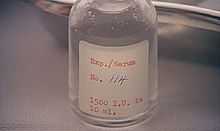CRM 114 (fictional device)

The CRM 114 Discriminator is a fictional piece of critical radio equipment in Stanley Kubrick's film Dr. Strangelove (1964), the destruction of which prevents the crew of a B-52 from hearing the recall code that would stop them from dropping their atomic bombs on the Soviet Union.
Real-life parallels
In Peter George's novel, Red Alert (1958), which was the basis for the film, the device is called the CRM 114.[1] Peter George was well-informed: Under the U.S. military Joint Electronics Type Designation System (The "AN" System),[2] CRM is the designator for an air-transportable cargo (C) radio (R) maintenance or test assembly (M),[3] and 114 is a feasible series number. If the CRM 114 were an actual U.S. military item, its official number would be designated as AN/CRM-114.
To ensure the enemy cannot plant false transmissions and fake orders, once the attack orders have been passed and acknowledged, the CRM 114 is to be switched into the receiver circuit. The three code letters of the period are to be set on the alphabet dials of the CRM 114, which will then block any transmissions other than those preceded by the set letters from being fed into the receiver.[4]
Prior to the introduction of addressed digital communications, some real-world analog communications systems performed a function very similar to the fictional CRM-114. Some aircraft radios used SELCAL (selective calling), which muted the receiver unless an assigned tone was received. Ground mobile radios used a similar system called CTCSS (Continuous Tone-Coded Squelch System).
Other uses
Kubrick also used a near homophone of "CRM 114", "Serum 114", for the name of a drug injected into Alex to help his reformation in A Clockwork Orange (1971).
Other non-Kubrick works contain references to "CRM 114", in apparent homage to Kubrick:
- An amplifier in Dr. Emmett Brown's laboratory in Back to the Future (1985) is labeled "CRM-114."
- In the Star Trek: Deep Space Nine episode Business as Usual (1997), "CRM-114" is a power hand weapon produced by the Breen, one that is "effective against moving vehicles and surface emplacements", and featuring a "quick recharge time."
- The 2005 remake of Fun with Dick and Jane includes a financial transaction form number "CRM-114".
- In the film Severance (2006), a black comedy involving a weapons manufacturer team-building trip to Eastern Europe, a reference is made to their CRM-114 anti-personnel land-mine that is apparently doing quite well.
- In the game HorrorClix (2006), the unit called "Carnage Bot" is also known by the code "CRM114", confirmed by game designer Seth Johnson to be a Kubrick reference.
- On the TV show Heroes, "CRM 114" is the catalog code assigned to the Kensei sword that Hiro is searching for in the episode "Parasite" (2007). (In the Heroes 360 experience during the episode, it was confirmed that the reference was intentional.) Malcolm McDowell, the star of A Clockwork Orange, also guest starred in this episode, as the current owner of the sword.
- CRM-114 is the ID for the bunker on the beach in Men In Black III, as well a prison block earlier in the movie.
- "CRM114" is also the name of a 2005 computer program which uses a statistical approach for classifying data and is especially utilized for filtering email spam. It was named after the fictional device.
- CRM-114 and CRM-115 are the names of medicinal drugs in Jon S. Baird's 2013 film titled "Filth" based on Irvine Welsh's novel, which in the director's commentary he states is a tribute to Kubrick as his favorite director, who always used CRM-114.
See also
References
- ↑ "What is the CRM-114 thing?". Visual-memory.co.uk. 2002-02-22. Retrieved 2014-02-18.
- ↑ "Designations Of U.S. Military Electronic And Communications Equipment". Designation-systems.net. Retrieved 2014-01-05.
- ↑ "F-16 Armament - US Tri-Service Designation System Electronic Equipment". F-16.net. Retrieved 2014-01-05.
- ↑ "The Kubrick FAQ". http://www.visual-memory.co.uk/faq/index4.html#slot47''.